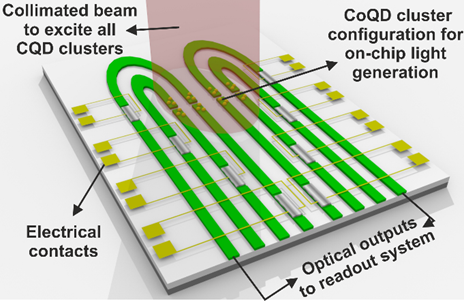GRACED Project : a new generation of sensors to monitor food quality

The European H2020 GRACED project (2021-2024) brings together 14 academic partners, SMEs, and associations of stakeholders in the agricultural sector to offer a low-cost solution for the detection of contaminants at the different stages of the production chain of fresh produce (fruits, vegetables), in particular at the earliest stage.

Schematic diagram of the GRACED sensor chip
GRACED project takes into account the needs of producers and the limitations of current technologies to offer an innovative solution for the detection of contaminants at all stages of the value chain of the fruit and vegetable industry.
The proposed technological solution is an on-chip plasmo-photonic interferometric sensor capable of rapidly and simultaneously detecting several target analytes. The chip will notably integrate photonic circuitry and semiconductor quantum nano-emitters generating guided light without excessive alignment constraints and microfluidic channels. These technological building blocks are developed at the ICB laboratory.
Developed by a multidisciplinary team and coordinated by CyRIC (Cyprus Research and Innovation Center Ltd), GRACED is part of the EU's Horizon 2020 program. The project was launched on January 1st, 2021 and will last three and a half years. Laurent Markey, CNRS Research Engineer at the ICB laboratory is the local scientific manager for the CNRS. Professor Jean-Claude Weeber and the Nanofabrication center of the ARCEN-CARNOT platform are also involved in this project.
- Read the full press release
- Local contact: Laurent MARKEY, laurent.markey@u-bourgogne.fr
- Website : www.graced.tech
> Follow our social networks :
- Facebook https://www.facebook.com/gracedproject
- Twitter https://twitter.com/GRACEDproject
- Instagram: @gracedproject
- LinkedIn: https://www.linkedin.com/company/gracedproject/
- kc_data:
- a:8:{i:0;s:0:"";s:4:"mode";s:2:"kc";s:3:"css";s:0:"";s:9:"max_width";s:0:"";s:7:"classes";s:0:"";s:9:"thumbnail";s:0:"";s:9:"collapsed";s:0:"";s:9:"optimized";s:0:"";}
- kc_raw_content:
